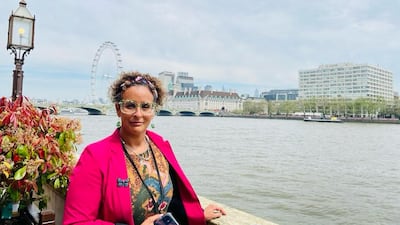British-Yemeni nurse Ofrah Muflahi describes herself as a member of an “unseen” community working in the UK’s National Health Service.
Until 2021, the Nursing and Midwifery Council did not recognise the ethnic background of Arabs and for decades the group had no formal representation in the workplace.
But that changed last year when Ms Muflahi, one of the most senior Arab nurses working in the UK, set up the British Arab Nursing and Midwifery Association (Banma).
“We, as people who identify as Arab, have always felt very invisible in the workforce,” she told The National.
“And because of the recent international recruitment, we get a lot of internationally educated nurses who come from across the Arabian Peninsula, so there was a growing need around support.
“Identity is really important to anybody, really. If you identify as part of a particular group, whether you’re Irish, whether you’re Arab, whether you’re Pakistani. And there was nowhere for them to go. There was nowhere for them to feel a sense of belonging in the workforce. So that was the main reason for setting up the association.”
The project has turned into an all-consuming passion to which Ms Muflahi now devotes her evenings, weekends and even lunch breaks, answering queries and giving the group’s almost 70 members advice.
“I burn the midnight oil and I also get up really early,” she said. The struggle was made all the harder by Ramadan, due to an even earlier start to eat suhoor before sunrise.
“I usually eat a bowl of porridge and dates,” she said, adding that she does not go back to sleep.
“I do get immensely tired. Normally around lunchtime,” she added.
“The first thing I do, even before I start my paid day jobs, is check the Banma inbox with my operational lead, who is also a volunteer, to make sure there isn’t anything urgent that may have come from a member.
“A lot of the time I will spend my lunch making phone calls or contacting someone who has contacted me, with my other committee members as well. We try to share the load.”
Queries and requests for help have increased in the wake of the Israel-Gaza war and strikes on Houthi targets in Yemen, which have brought issues of Arab identity in the workplace into sharp focus for many.

“This Ramadan was particularly difficult because of what's happening in Gaza,” she said.
“We have a lot of Palestinian nurses, some of whom are refugees in this country, who are fearful of speaking about how they are feeling within the workplace, for example.”
Many of their family members are still in Gaza.
“One of the Palestinian nurses lost her brother when a bomb landed in the street. His wife had just had a baby. So it was really difficult for her. She’s thousands of miles away, so she’s not able to mourn the death of her brother as she would if she had been in Palestine, or within the family.
“Ordinarily, if you had a family member in another country you would jump on a plane and go to the funeral and support the family and mum. Obviously, she wasn’t able to do that.”
The requests for help have to be juggled between the responsibilities of Ms Muflahi's day jobs as the UK professional lead with the Royal College of Nursing and a non-executive director for a local NHS provider.
But her stage of her life and career mean she now has more spare time to devote to her cause.
She lives with her husband near Birmingham, and her son has grown up so she has more time in the evenings and at weekends than when he was younger.
Ms Muflahi said she often jumps back on her Banma WhatsApp group or a call, or heads straight to a committee meeting after work.
Sleep does not come as easily as it used to, particularly since the outbreak of the war in Gaza and strikes on Yemen.
She often does not get to bed until 11pm and is up again as early as 5.30am on normal days and even earlier during Ramadan.
“I used to get more sleep. What’s going on [in the world] is making it harder for many of us to sleep. I still have family in Yemen. My mum is 86, all her family, her sisters, her brothers, her nieces, her nephews … they are all still in Yemen,” she said.

“I think it’s a particularly sensitive time for the whole of Yemen at the moment, so I have that to contend with [that] as well.”
But she finds solace in offering her fellow Arab nurses support, “especially when you get feedback from nurses or midwives who have progressed as a result of the dialogue within the association”, she said.
“They have been able to be mentored. We have empowered them to apply for jobs and supported them through interview techniques. There is a sense of pride there in terms of what we do.”


